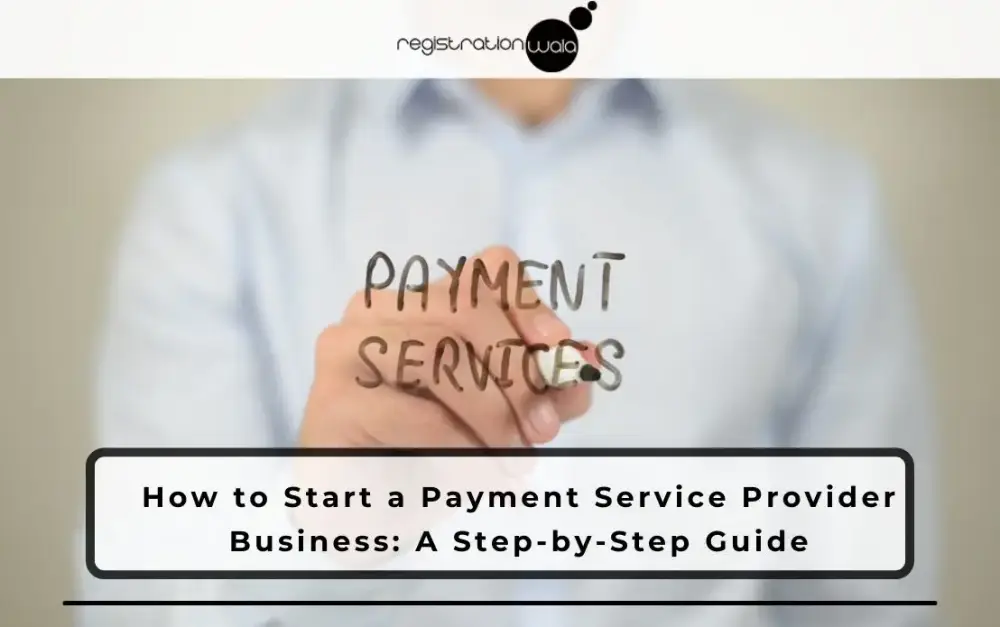A Guide to Start a Payment Service Provider Business
- October 28, 2023
- Registrationwala

- Home
- /
- Knowledge Base
- /
- News & other businesses
- /
- Blog
- /
- A Guide to Start a Payment Service Provider Business
A Guide to Start a Payment Service Provider Business
The Reserve Bank of India which is a central bank plays an essential role in developing a national payment system for safe, secure, efficient and authorised payment systems in the country. As per the Payment and Settlement System Act, 2007, no person other than RBI can commence or operate a payment system in India unless authorised by RBI.
The Board for Regulation and Supervision of Payment and Settlement Systems (BPSS), is a committee under the RBI which has the highest policy-making power on payment systems in RBI. Many people misunderstand the payment aggregator and payment service provider. All the questions related to PSP are shared below in this article to set up a payment service provider business in India.
What are Payment Service Providers?
The payment service providers are the third parties that help businesses accept a wide range of payment methods such as credit cards, debit cards, digital wallets and bank transfers through a single platform or integration. Mainly, it conducts a smooth transactional flow between merchants and customers. Some examples of payment service providers in India are Paytm, Razorpay, PayU, BillDesk, PhonePe, etc.
Usually, the terms Payment Service Provider, Payment Aggregator and Payment Gateway confuse many people. If said in simple terms, PSP is a pool under which both PGs and PAs fall. As per the RBI:
- Payment Aggregators are financial entities that accept payment from different customers through various instruments.
- Payment Gateways are financial entities that provide financial infrastructure to route and facilitate online payments without handling the funds.
The PSPs are the entities that allow e-commerce websites and merchants to accept payment from customers in different instruments without building a separate payment integration system. If the non-bank entities want to offer services to payment aggregators, they must apply for authorisation from RBI under the PSS Act.
How a Payment Service Provider Business Works?
The PSPs partner up with the banks to provide transactional services to businesses from the customers, partners and vendors. In the process of accepting money, the business does not need to check for fraudulent transactions, the PSPs will check the authenticity of the transaction and approve it. Let’s check how a PSP model works:
- A customer purchases a product and initiates the payment.
- Now PSP came into the picture and sent the information given by the provider to a bank. This is done to cross-verify the information, and funds before the approval and rejection of the payment.
- An OTP will sent to the phone number of the customer.
- Once the payment is verified, the bank will transfer the funds to the merchant’s account.
Capital Requirements for Payment Service Provider Business
The following capital requirements that should fulfil to set up a payment service provider license in India are as follows:
- The NBFCs and scheduled banks must meet the capital adequacy requirements. Only these entities are allowed to issue prepaid payment instruments.
- The authorised entities under FEMA that issue foreign exchange prepaid instruments are exempt from the guidelines. These instruments are uses in limit to the use of current account transactions.
Documents Required to Register a PSP Business
The following documents are required to start a payment service provider business:
- Certificate of Incorporation (COI) of the Company issued by the Registrar of Companies (ROC).
- PAN card and address proof of the Directors
- Digital Signature Certificate (DSC) and Director Identification Number (DIN) of the Directors
- Registered office’s address proof
- Company’s current bank account
- Next five year’s business plan of the company
- Report of testing code by a software agency
Process of Registering a Payment Service Provider License
As per the Payment and Settlement System Act, of 2007, only RBI can operate or commence a payment system except under and in accordance with an authorisation
issued by the Reserve Bank of India under the provisions of this Act.
Step 1: The application must be sent to RBI under Section 5 of the PSS Act in Form A. This application must sent to the Chief General Manager of the Department of PSS at the Central Office of the RBI.
Step 2: The RBI has the power to authorise the license of PSP as per Section 6 of the Act. Also, the RBI can inquire about the details of the applicant which clarify the details submitted in the application and check the credentials of the involved participants.
Step 3: Before issuing the license the RBI will check the following requirements:
- Financial status and integrity of the applicant.
- Credit and monetary policies.
- The time frame for authorisation.
- Terms and conditions for customers and payment providers.
- The proposed way of transferring the given payment system.
Step 4: If the RBI is satisfied with the requirements mentioned in Section 7(1). Then it issues the authorisation certificate in Form B for commencing and carrying payments. The authorisation will take effect from the date mentioned by the RBI as per the conditions.
Step 5: As per Section 4 of the PSS Act, RBI should process the application of authorisation within the time limit of six months from the issue date of application.
Conclusion
To conclude, a payment service provider helps reduce integration and processing costs and helps in accepting payments from different instruments. Anyone who is looking to start a business must choose PSP businesses to accept a wider variety of payments from anyone in any mode. If you want to get a payment gateway license, then reach out to Registrationwala.
- 1964 views
